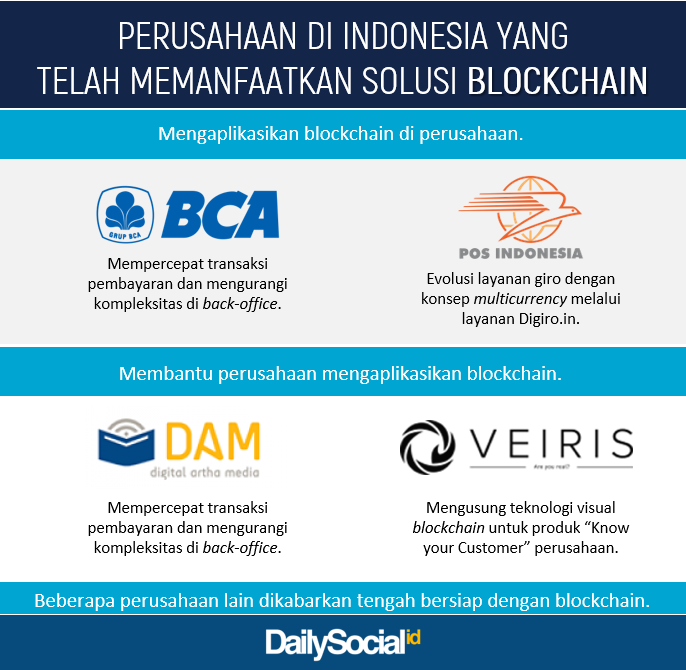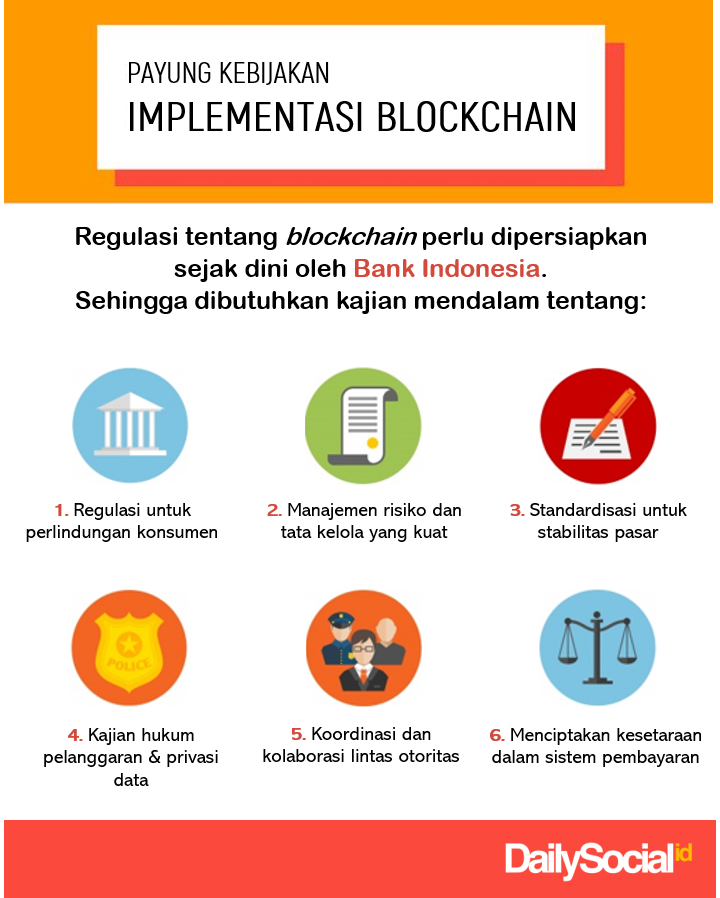A look into blockchain implementation, case studies, and policies in the archipelago

Image Credit: Kyle Johnson on Unsplash
In its past feature “Understanding Cryptocurrency and its Transaction Mechanism” (in Bahasa Indonesia), DailySocial digs through the basic concepts of cryptocurrency and how blockchain works as one of its application. In the article, it is generally concluded that blockchain provides certain benefits when implemented in a business process. First, its decentralised nature is able to provide greater access to financial services due to the limitless transaction process. It is also able to provide efficiency due to the unrestricted time and space of its operation.
Second, it enables the creation of a financial solution with more affordable transaction fee –compared with the rate of conventional transaction– without compromising the security aspect. The nature of a cyrptocurrency, which consists of complex encrypted algorithm that is validated by support network, has turned blockchain into a considerably secure option. With all these benefits, it is expected that the banking industry will be the most benefited from blockchain disruption, despite limited implementation on the ground today.
According to Eny Panggabean, executive director of payments system policy at Bank Indonesia, blockchain implementation in Indonesia’s public financial sector can be designed in many forms. For example, it can be designed to enable cross-border payment and remittance through private blockchain. Apart from services that are directly related to financial transaction, Panggabean also added several other scenarios that can be enhanced through blockchain, such as land ownership registry, stock trade recapitulation, to recording government bond.
Dimension Data Group CTO Ettienne Reinecke also gives examples of blockchain implementation that are considered in line with the development of digital industry today: Supporting Internet-of-Things (IoT) businesses. On an IoT platform that is run real-time, businesses are able to run millions of transactions gathered from distributed machines. It is bound to produce plenty of logs; if the system implements a transactional model that has to be managed in a centralised mode using middleware, there is a strong possibility that it will be slow and costly.
Understanding the risk
Behind its decentralised nature, blockchain also presents several risks that need to be understood. A blockchain-based system is considered “open”; in this context, there is no customer protection guarantee as in a decentralised process (i.e with Bank Indonesia as regulator). All transactions are managed in the public domain, with the risk of customers’ data privacy not being taken care of. Beyond the system, blockchain also leaves room for criminal actions such as oney laundering and terrorism funding. The authorities would have a hard time tracking or controlling these transactions.
Also Read: Indonesian blockchain association launches, pushes for regulation on tech implementation
One of the state’s responsibilities in the financial sector is maintaining stability of existing system. If blockchain remains unregulated, there is a great possibility that a disruption is set to happen. Existing centralised policies always emphasised on monetary policies as released by Bank Indonesia. Therefore, for the future massive implementation of blockchain, there are many tasks left to do, particularly by monetary system regulatory bodies.
Another crucial point that needs to be looked at is the testing and validation of the promised benefits of blockchain technology. Starting from that point, the government needs to adjust regulation and set up law enforcement rule to support existing system. For example, by setting up regulation to prevent corruption or money laundering. A strong risk management and operational standard are also needed to prevent market fragmentation. Building a blockchain system also requires massive investment, so the government also needs to study the return of investment (ROI) of its implementation.
A case study of blockchain implementation in Indonesia and the world
Bank Central Asia (BCA), a leading privately owned banking institution in Indonesia, claimed to have begun implementing blockchain technology for the company’s internal operations. The goal of the implementation is to speed up payment transaction and to simplify back-office transactions. In addition to BCA, national postal service Pos Indonesia has also developed a system called Digiro.in, a form of blockchain implementation for multicurrency service. The platform is considered as the evolution of existing accounts services, a business model of Pos Indonesia.
There is also Digital Artha Media Corporation (DAM Corp), a fintech enabler company with operations in Indonesia. The company develops white label blockchain solutions to help businesses in the financial sector. It claimed to be able to help businesses transition from a centralised to a decentralised business model with its solutions. Veiris, a Singapore-based startup which had just launched its service in Indonesia, offers a blockchain-based computer visual technology to help corporations with their know-your-customers (KYC) process.

Infographic on blockchain implementation in Indonesia. Image Credit: DailySocial
Also Read: Indonesian postal service embraces blockchain with the launch of Digiro.in
Experts’ opinion on blockchain implementation
On the #SelasaStartup discussion forum hosted by DailySocial, Country Blockchain Leader IBM Indonesia Juliandri Jenie further explained the implementation of blockchain across different fields. In his presentation, Jenie talked about Spotify’s ambition to bring in blockchain into digital music industry. In April 2017, Spotify acquired blockchain startup Mediachain Labs, with the goal to provide a fairer royalty mechanism for songwriters. The blockchain technology that is being developed is able to track the writer of the song, the songs that they have created, and other factors, enabling a more accurate distribution of royalty.
For Indonesia, Jenie said, there are several fields that can be optimised with blockchain, one of them being supply chain. In explaining the application, he said:
“Blockchain will be very beneficial for supply chain companies. Benefits that they can feel is the increased visibility of logistics and documentation information throughout the supply chain. Other benefits include cost-saving and risk management through automation, measurable tracking. It is also safe from physical risks and incidents in the supply chain, and enabling the creation of new business model.”
At the end of last year, DailySocial attended an international blockchain conference in Bali where experts showcased their ideas and discoveries in the advanced implementation of blockchain. CyberMiles Chief Scientist Michael Yuan was one of them; in his presentation he explained how e-commerce businesses will be benefited by the technology, for example in increasing the efficiency of identity management. The benefits also include tracking system and product authenticity, as data saved in the blockchain system can be synchronised through the network. The solution is believed to be able to re-revolutionise the business and tech aspect of e-commerce.
According to Decent CEO Matej Michalko at the same conference, blockchain is believed to be able to provide solutions to a problem that has haunting the content industry all along: Piracy. Through the blockchain system, creators are able to easily sell and distribute contents to customers directly, a mechanism known as data exchange. Imagine if contents can be distributed through encryption and unique identity for every customer. It will be easier to track breaches; it can even prevent it from happening in the first place.
Bank Indonesia’s role as regulator
As a preventive measure, Indonesia needs to immediately set up new regulation on blockchain. The progress may have been slow, but learning from past experience with previous technology, Bank Indonesia must play a key role in this.
First of all, when it comes to consumer protection, there is a need to provide solutions for transparency or complaints for every business process.

Infographic on the regulation ‘umbrella’ that needs to be prepared for blockchain implementation in Indonesia
Also Read: Breaking the mold: How these 6 blockchain companies aim to reinvigorate the industries
Bank Indonesia should also serves as a trigger for collaboration between authorities, including in building partnerships with international bodies, considering that blockchain’s scope goes beyond one country. In order to prevent any possible negative impact from payments system, there is a need to ensure a level playing ground among implemented payments systems. Last but not least, Bank Indonesia needs to ensure the priorities scale; while technological advances are important, the central bank still needs to consider the progress, stability, and integrity of the nation’s economy.
According to Bank Indonesia, the central bank will need two years to finish review process for digital money, expecting to complete it by 2020. It seems like regulation on blockchain will be part of it.
Enthusiasm as part of early stage synergy
Following the progress of blockchain adoption in Indonesia and the world, six locally based blockchain companies –Blocktech Indonesia, Blockchain Zoo, IndoDAX, Indonesian Blockchain Network, Luno, and Pundi X– have founded the Indonesian Blockchain Association.
Led by IndoDAX CEO Oscar Darmawan, the association was founded with several missions. One of them being pushing for collaboration between policy makers and business owners using blockchain as their technological base.
As a first step, the association has also become part of the Indonesia Chamber of Commerce (KADIN), working together to ensure balance between regulation and innovation in Indonesia.
—
The article Mengeksplorasi Potensi Pemanfaatan Blockchain di Indonesia was written by Randi Eka Yonida for DailySocial. English translation and editing by e27.
The post Exploring the potential of blockchain implementation in Indonesia appeared first on e27.